教师资格笔试备考英语语言学高频考点解析
英语教师资格考试常见考点解析
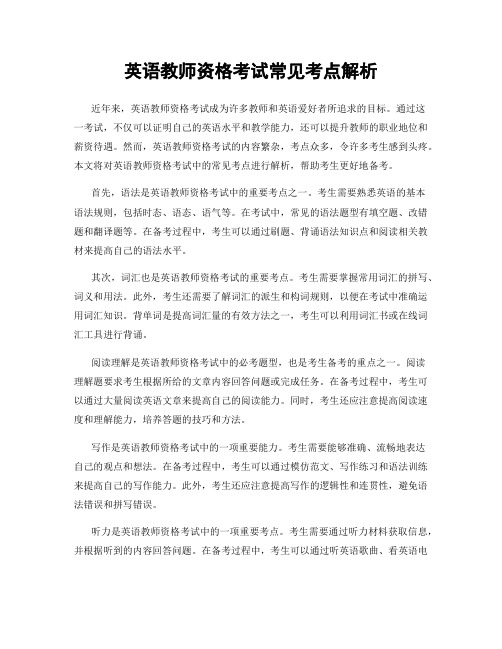
英语教师资格考试常见考点解析近年来,英语教师资格考试成为许多教师和英语爱好者所追求的目标。
通过这一考试,不仅可以证明自己的英语水平和教学能力,还可以提升教师的职业地位和薪资待遇。
然而,英语教师资格考试的内容繁杂,考点众多,令许多考生感到头疼。
本文将对英语教师资格考试中的常见考点进行解析,帮助考生更好地备考。
首先,语法是英语教师资格考试中的重要考点之一。
考生需要熟悉英语的基本语法规则,包括时态、语态、语气等。
在考试中,常见的语法题型有填空题、改错题和翻译题等。
在备考过程中,考生可以通过刷题、背诵语法知识点和阅读相关教材来提高自己的语法水平。
其次,词汇也是英语教师资格考试的重要考点。
考生需要掌握常用词汇的拼写、词义和用法。
此外,考生还需要了解词汇的派生和构词规则,以便在考试中准确运用词汇知识。
背单词是提高词汇量的有效方法之一,考生可以利用词汇书或在线词汇工具进行背诵。
阅读理解是英语教师资格考试中的必考题型,也是考生备考的重点之一。
阅读理解题要求考生根据所给的文章内容回答问题或完成任务。
在备考过程中,考生可以通过大量阅读英语文章来提高自己的阅读能力。
同时,考生还应注意提高阅读速度和理解能力,培养答题的技巧和方法。
写作是英语教师资格考试中的一项重要能力。
考生需要能够准确、流畅地表达自己的观点和想法。
在备考过程中,考生可以通过模仿范文、写作练习和语法训练来提高自己的写作能力。
此外,考生还应注意提高写作的逻辑性和连贯性,避免语法错误和拼写错误。
听力是英语教师资格考试中的一项重要考点。
考生需要通过听力材料获取信息,并根据听到的内容回答问题。
在备考过程中,考生可以通过听英语歌曲、看英语电影和做听力练习来提高自己的听力水平。
同时,考生还应注意提高听力的集中力和理解能力,熟悉常见的听力题型和解题技巧。
除了以上几个常见考点外,英语教师资格考试还涉及到教育学和教育心理学的知识。
考生需要了解教育学的基本概念和理论,掌握教育心理学的原理和应用。
教师资格考试高频考点解析:英语语言学

教师资格考试英语笔试备考建议
教师资格笔试,英语学科如何进行备考呢?
首先来看看英语学科笔试的特点:英语学科笔试主要考察单选,完形填空和阅读理解,对于绝大多数考生来说,比较难的是单选部分,涉及语法知识比较多,大的语法点会考到,但是只掌握大的语法点是不够的,大概三分之一的题目会考察比较细的语法,所以考前要对语法项目的特例,和细节比较熟悉。
同时,教师资格考试英语考试的考生分为两个部分,对于英语专业的考生来说,如果在大学期间主要学习的事文学和文化,那么可能在阅读理解部分有一些单词的优势,但是,如果想在完形填空和单选里面取得较好的分数并非易事;对于非英语专业的考生来说,在大学期间考四级和六级基本都是以阅读理解和完形填空题目为主,很多考生在过级之后再也没有进行任何语法和但系的积累。
所以考前必须要做以下两件事情。
不但对于笔试有好处,对于笔试通过之后的面试也是很好的准备。
教师资格考试英语笔试备考建议如下:
第一,一定要加强单词的积累,最好通过做真题来积累,这样可以一举两得。
建议可以准们去准备一中考和高考的题目来细细解析,可以总结出很多高频词汇。
第二,一定要多做单选题,提高做题的准确率。
单选题目的部分不能够只靠题海战术来积累。
必须要先对整个语法结构和细节有比较好的了解。
所以要理论和题目双重并举。
总之,千里之行,始于足下,希望大家要想从事教育行业,从现在开始努力。
希望以上的教师资格考试英语笔试备考建议能够对考生有较好的帮助。
国家教师资格考试英语学科知识与教学能力考试重点
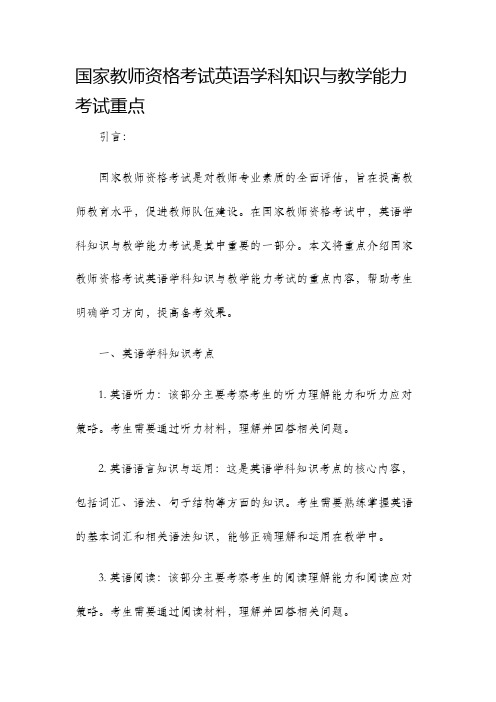
国家教师资格考试英语学科知识与教学能力考试重点引言:国家教师资格考试是对教师专业素质的全面评估,旨在提高教师教育水平,促进教师队伍建设。
在国家教师资格考试中,英语学科知识与教学能力考试是其中重要的一部分。
本文将重点介绍国家教师资格考试英语学科知识与教学能力考试的重点内容,帮助考生明确学习方向,提高备考效果。
一、英语学科知识考点1. 英语听力:该部分主要考察考生的听力理解能力和听力应对策略。
考生需要通过听力材料,理解并回答相关问题。
2. 英语语言知识与运用:这是英语学科知识考点的核心内容,包括词汇、语法、句子结构等方面的知识。
考生需要熟练掌握英语的基本词汇和相关语法知识,能够正确理解和运用在教学中。
3. 英语阅读:该部分主要考察考生的阅读理解能力和阅读应对策略。
考生需要通过阅读材料,理解并回答相关问题。
4. 英语写作:该部分主要考察考生的写作能力和写作应对策略。
考生需要写作英语短文或书信等,表达自己的观点和理解。
二、教学能力考点1. 教学设计:考生需要具备良好的教学设计能力,能够根据教学目标和学生实际情况进行教学内容的设计,包括教学步骤、教学方法等方面。
2. 教学组织实施:考生需要具备良好的教学组织能力,能够合理安排教学时间、掌握教学节奏和教学形式,使教学过程有序进行。
3. 教学反思与评价:考生需要具备良好的教学反思能力,能够对教学过程进行自我评价,并进行教学改进。
三、备考指导1. 熟悉考试大纲:考生需要认真阅读并理解国家教师资格考试英语学科知识与教学能力考试的考试大纲,明确考试要求和重点内容。
2. 整理学习材料:根据考试大纲,整理相关的学习资料,包括教材、参考书、模拟题等。
合理安排学习时间,有针对性地进行学习。
3. 系统复习:根据考试的知识点和考点,进行系统的复习。
可以采用分组、分类等方式整理知识点,加深记忆。
4. 模拟训练:在备考过程中,进行模拟训练。
可以选择历年真题进行模拟考试,对照考纲和参考答案,查漏补缺,提高应试能力。
教师资格证高中英语考点总结(语言学+句法)
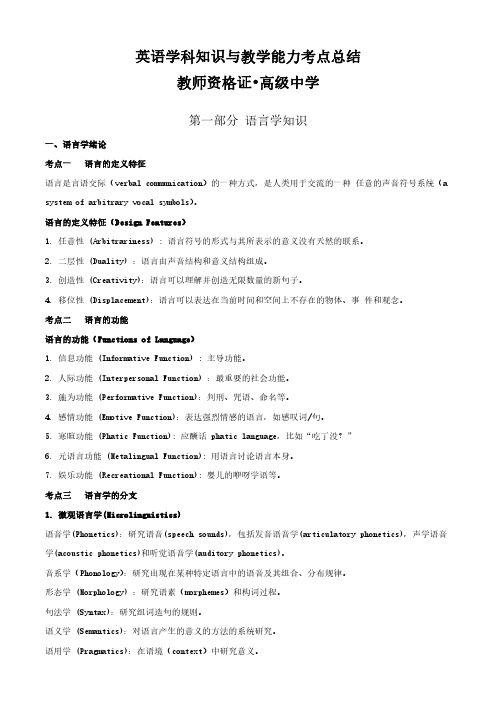
英语学科知识与教学能力考点总结教师资格证•高级中学第一部分语言学知识一、语言学绪论考点一语言的定义特征语言是言语交际(verbal communication)的一种方式,是人类用于交流的一种任意的声音符号系统(a system of arbitrary vocal symbols)。
语言的定义特征(Design Features)1.任意性(Arbitrariness):语言符号的形式与其所表示的意义没有天然的联系。
2.二层性(Duality):语言由声音结构和意义结构组成。
3.创造性(Creativity):语言可以理解并创造无限数量的新句子。
4.移位性(Displacement):语言可以表达在当前时间和空间上不存在的物体、事件和观念。
考点二语言的功能语言的功能(Functions of Language)1.信息功能(Informative Function):主导功能。
2.人际功能(Interpersonal Function):最重要的社会功能。
3.施为功能(Performative Function):判刑、咒语、命名等。
4.感情功能(Emotive Function):表达强烈情感的语言,如感叹词/句。
5.寒暄功能(Phatic Function):应酬话phatic language,比如“吃了没?”6.元语言功能(Metalingual Function):用语言讨论语言本身。
7.娱乐功能(Recreational Function):婴儿的咿呀学语等。
考点三语言学的分支1.微观语言学(Microlinguistics)语音学(Phonetics):研究语音(speech sounds),包括发音语音学(articulatory phonetics),声学语音学(acoustic phonetics)和听觉语音学(auditory phonetics)。
音系学(Phonology):研究出现在某种特定语言中的语音及其组合、分布规律。
教师资格证考试科目三-初中英语考点(英文版)

教师资格证考试科目三-初中英语考点(英文版)语言学linguistics1.design feature of languageArbitrariness\duality\creativity\displacement\cultural transmission2.function of languageInformative\interpersonal\performative\emotive\phatic\recreational\metalingual3.辨析Descriptive vs prescriptive\synchronic vs diachronic\langue vs parole\competence vs performance4.phoneticStudy: characteristics of speech sounds分类:with or without obstruction of air stream : vowels /consonant4.1 vowels (pure vowels monophthongs)The position of the tongue in the mouth: Front\Central\Back;The openness of the mouth: close\semi-close\semi-open\open;The shape of the lips: rounded \unroundedThe length of the vowels:long\shortDiphthongs;falling/rising4.2 consonentManner of articulation:stops\fricative\affricates\liquds\nasals\glidesPlace of articulation: bilabial\labio-dental\dental\alveolar\palatal\velar\glottalVoicing: voiceless\voiced5 phonologyStudy:the distinctive sound units of a language and their relationship to one anotherPhone\phoneme\allophonePhonemic contrast\complementary distribution\minimal pair6 morphologyStudy:internal structure of words6.1 morpheme: free \bound6.2 allomorph: root \ affix6.3 word formation :derivation\compounding\conversion\clipping\blending\backformation\acronyms and abbreviations\coinage7 semanticsStudy: linguistic meaning7.1 意义关系:synonymy\homonymy\hyponymy\antonymy\polysemy7.2 句子关系:X is synonymous with Y;X is inconsistent with Y; X entails Y(Y is an entailment of X);X presupposes Y(Y is a prerequisite of X);X is a contradiction; A is semantically anomalous;8 pragmaticsStudy:8.1 speech act :locutionary act\illocutionary act\perlocutionary act;8.2 cooperative principle:quantity\quality\relation\manner maxim9 修辞学Simile\metaphor\metonymy\synecdoche\alliteration\endrhyme\oxymoron\pun\euphemism\parallelism\exaggeration\personification\irony\onomato poeia\synesthesia\transferred\spoonerism外语教学理论1 view on language: the structural view of language;\the functional view of language;\ the ineractional view of language;2 views on language learning:behaviorist theory; \cognitive theory; \constructivist theory; \socio-constructivist theory。
中英文对照英语语言学重要概念解析英语专业学生教师资格证考生

第一节语言的本质一、语言的普遍特征(Design Features)任意性Arbitratriness:shu 和Tree都能表示“树”这一概念;同样的声音,各国不同的表达方式双层结构Duality:语言由声音结构和意义结构组成(the structure of sounds and meaning)多产性productive: 语言可以理解并创造无限数量的新句子,是由双层结构造成的结果(Understand and create unlimited number with sentences)移位性Displacemennt:可以表达许多不在场的东西,如过去的经历、将来可能发生的事情,或者表达根本不存在的东西等文化传播性Cultural Transmission:语言需要后天在特定文化环境中掌握二、语言的功能(Functions of Language)1. 传达信息功能Informative:最主要功能The main function2. 人际功能Interpersonal:人类在社会中建立并维持各自地位的功能establish and maintain their identity3. 行事功能performative:现实应用——判刑、咒语、为船命名等Judge,naming,and curses4. 表情功能Emotive:表达强烈情感的语言,如感叹词/句exclamatory expressions5. 寒暄功能Phatic:应酬话phatic language,比如“吃了没?”“天儿真好啊!”等等6. 元语言功能Metalingual:用语言来谈论、改变语言本身,如book可以指现实中的书也可以用“book这个词来表达作为语言单位的“书”三、语言学的分支1. 核心语言学Core linguisticl 语音学Phonetics :关注语音的产生、传播和接受过程,着重考察人类语言中的单音。
教资英语-语言教学知识与能力理论精讲及真题解析

教资英语-语言教学知识与能力理论精讲及真题解析先梳理一下思路【解析】语言教学知识与能力:讲义的顺序是外语教学常用的方法、语言知识教学、语言技能教学,讲的时候先讲语言技能教学,再讲语言知识教学,最后讲外语教学常用方法。
1.语言技能教学,这部分与教学设计有关,所以会先讲。
语言技能部分呈现的要点有:(1)教学内容:对应的就是知识目标或者技能目标,大家比较熟悉。
(2)教学原则:比如“我是一个有原则的人”,说明这个人知道该做什么,不该做什么。
对于教学原则,就是注意事项,应该做什么,不应该做什么,更多的强调应该做什么。
(3)教学策略:方法、方案,有哪些方法可以实施。
(4)教学模式:有PPP 模式和PWP 模式,还有一些课型有另外的模式,主要以阅读课和听说课为主要的考查方向,这里会详细的讲解。
(5)教学过程和教学活动:对应的就是已经讲解过的教学设计部分的内容。
2.语言知识教学:之前讲PPP 和PWP 已经铺垫过,知识型涉及到语音、词汇、语法教学,这个部分初高中没有考过对应的课型,但是单选和简答、教学情境分析考查过。
3.外语教学常用的教学方法:单选题备考,也可以考主观答题,比如案例分析题。
4.首先学习第一个部分,语言技能教学:听力教学考查重点Part 1听力技能教学P146一、教学内容二、教学原则三、教学模式四、教学过程五、教学策略六、听力基本技能及教学活动【解析】听力技能教学:讲义 146 页。
呈现六个方面,老师在课件上用不同的颜色标注清楚了,绿色代表已经学习过的知识,比如教学过程听力如何安排已经讲过了;黑色部分虽然没有明确讲,但是没有那么重要;标红色的是讲解过程的重点,听力教学中重点讲教学原则和教学模式。
一、听力--教学内容了解P146听力技能教学的内容主要包括听力知识和听力技能。
(一)听力知识听力知识包括语音、听力策略、语言的使用等。
(二)听力技能听力技能包括辨别、识别交流的指示、听大意、听细节等。
【解析】听力教学内容:主要包括听力知识和听力技能。
教师资格证科目三-英语语言学知识点整理
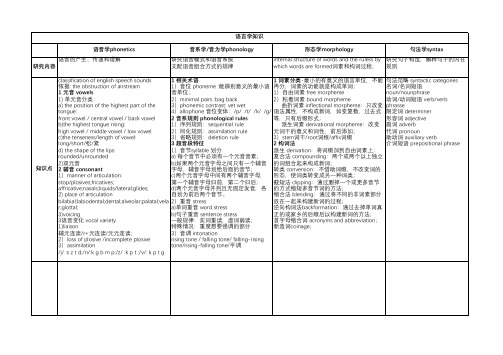
第一个辅音字母归前,第二个归后; 截短法 clipping:通过删掉一个或更多音节
affricative;nasals;liquids/lateral;glides;
d)两个元音字母并列且无固定发音,各 的方式缩短多音节词的方法;
2) place of articulation
自划为前后两个音节。
缩合法 blending:通过将不同的非词素部分
3)phonemic contrast: vet wet
曲折词素 inflectional morpheme:只改变 phrasse
tongue:
4)allophone 音位变体:/p/ /t/ /k/ /g/ 语法属性,不构成新词,如变复数,过去式 限定词 determiner
front vowel / central vowel / back vowel
知识点
classification of english speech sounds
1 相关术语
1 词素分类-最小的有意义的语言单位,不能 句法范畴 syntactic categories
依据: the obstruction of airstream
1)音位 phoneme :能辨别意义的最小语 再分,词素的功能就是构成单词;
2 音系规则 phonological rules
等,只有后缀形式;
ቤተ መጻሕፍቲ ባይዱ
形容词 adjective
b)the highest tongue rising:
1)序列规则:sequential rule
派生词素 derivational morpheme:改变 副词 adverb
high vowel / middle vowel / low vowel
教师资格考试高频考点解析:英语语言学-推荐下载
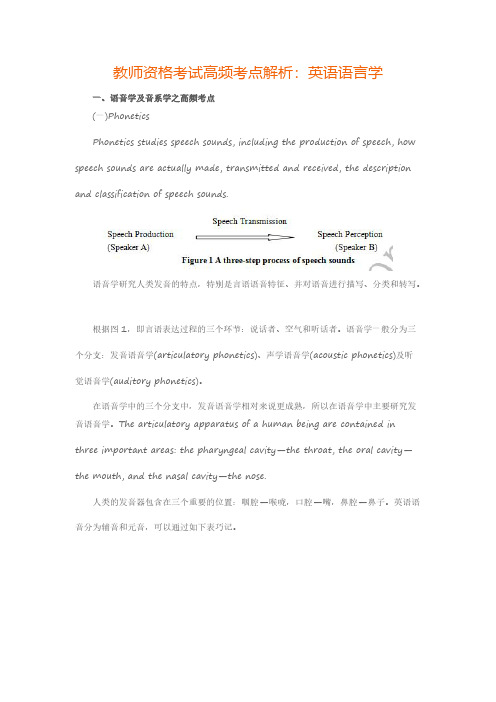
教师资格考试高频考点解析:英语语言学一、语音学及音系学之高频考点(一)PhoneticsPhonetics studies speech sounds, including the production of speech, how speech sounds are actually made, transmitted and received, the description and classification of speech sounds.语音学研究人类发音的特点,特别是言语语音特征、并对语音进行描写、分类和转写。
根据图1,即言语表达过程的三个环节:说话者、空气和听话者。
语音学一般分为三个分支:发音语音学(articulatory phonetics)、声学语音学(acoustic phonetics)及听觉语音学(auditory phonetics)。
在语音学中的三个分支中,发音语音学相对来说更成熟,所以在语音学中主要研究发音语音学。
The articulatory apparatus of a human being are contained in three important areas: the pharyngeal cavity—the throat, the oral cavity—the mouth, and the nasal cavity—the nose.人类的发音器包含在三个重要的位置:咽腔—喉咙,口腔—嘴,鼻腔—鼻子。
英语语音分为辅音和元音,可以通过如下表巧记。
(二)PhonologyPhonology studies the rules governing the structure, distribution, and sequencing of speech sounds and the shape of syllables. It deals with the sound system of a language by treating phoneme as the point of departure. There are some important definitions in phonology that we should pay more attention.1. Minimal PairWhen two different forms are identical in every way except for one sound segment which occurs in the same place in the strings, the two sound combinations are said to form a minimal pair. For example, dill and kill area minimal pair because they differ from each other by the initial sound [d] and [k].最小对立体:如果两个词,除了出现在同一位置上的一个音以外,其余的音都相同,那么这两个词就构成了一个最小对立体。
教师资格证考试英语学科知识语言学整理高中英语

教师资格证考试英语学科知识语言学整理高中英语高中英语是教师资格证考试英语学科中的一个重要内容。
在高中英语学科中,语言学是一个关键的知识点。
语言学是研究语言的科学,它涉及到语言的结构、规则和使用。
在高中英语的教学中,教师需要了解语言学的基本概念和理论,以便能够有效地教授英语知识和技能。
下面,我将整理一下高中英语语言学的内容,以供教师资格证考试备考参考。
语言学是研究人类语言的学科,它主要包括以下几个方面的内容:一、语音学:语音学是研究语音的学科。
在高中英语教学中,教师需要了解英语的音位、音素和音节的基本概念。
此外,教师还需要了解音标的使用方法,以便能够准确地发音和教授发音知识。
二、语法学:语法学是研究语言的结构和规则的学科。
在高中英语教学中,教师需要了解英语的基本句型结构,如主谓结构、主谓宾结构和主系表结构等。
同时,教师还需要了解英语的时态、语态和语气等基本语法概念,以便能够正确地使用和教授英语语法知识。
三、词法学:词法学是研究词汇的学科。
在高中英语教学中,教师需要了解英语的词汇分类和构词规则。
此外,教师还需要了解英语的词义和词汇搭配等基本知识,以便能够准确地使用和教授英语词汇知识。
四、句法学:句法学是研究句子结构的学科。
在高中英语教学中,教师需要了解英语的句子类型和句子结构。
此外,教师还需要了解英语的从句、状语从句和定语从句等基本句法知识,以便能够正确地使用和教授英语句法知识。
五、语义学:语义学是研究词义和意义的学科。
在高中英语教学中,教师需要了解英语的词汇义项和词汇扩展等基本概念。
此外,教师还需要了解英语的词义变化、义项转换和词义辨析等语义知识,以便能够准确地使用和教授英语语义知识。
在教师资格证考试中,语言学是一个非常重要的知识点。
掌握了语言学的基本概念和理论,教师才能够有效地教授高中英语知识和技能。
因此,考生在备考过程中要重点关注语言学的学习和掌握,加强对语音学、语法学、词法学、句法学和语义学的理解和应用。
2023教师资格证初中英语语言知识与能力之语用学分析
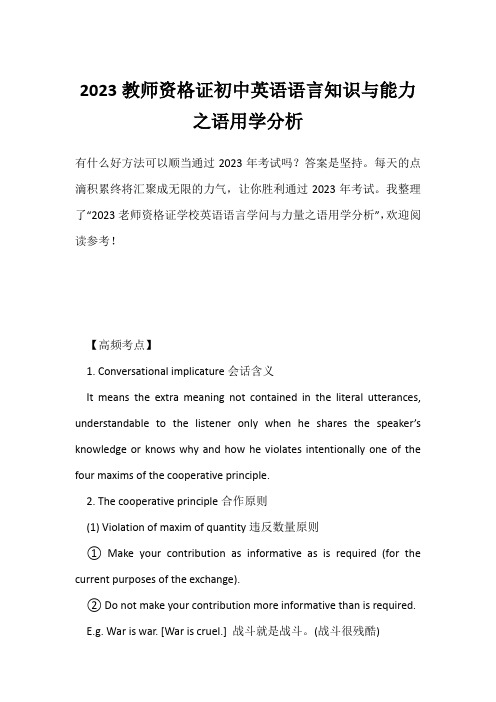
2023教师资格证初中英语语言知识与能力之语用学分析有什么好方法可以顺当通过2023年考试吗?答案是坚持。
每天的点滴积累终将汇聚成无限的力气,让你胜利通过2023年考试。
我整理了“2023老师资格证学校英语语言学问与力量之语用学分析”,欢迎阅读参考!【高频考点】1. Conversational implicature会话含义It means the extra meaning not contained in the literal utterances, understandable to the listener only when he shares the speaker’s knowledge or knows why and how he violates intentionally one of the four maxims of the cooperative principle.2. The cooperative principle合作原则(1) Violation of maxim of quantity违反数量原则① Make your contribution as informative as is required (for the current purposes of the exchange).② Do not make your contribution more informative than is required.E.g. War is war. [War is cruel.] 战斗就是战斗。
(战斗很残酷)(2)Violation of maxim of quality违反质量原则① Do not say what you believe to be false.② Do not say that for which you lack adequate evidence.E.g. Paul is made of iron. [Paul has some properties similar to those of iron.]违反质量准则,由于很明显没有人是由钢铁做成的。
教师招聘笔试浙江教师统考英语语言学考点梳理

浙江教师统考英语语言学考点梳理漆家佳在浙江省教师招聘考试统考笔试的过程中,对于英语语言学的考察是很多考生反馈的难点所在。
下面,华图教师就近几年浙江省教师招聘统考英语专业知识的真题,为大家总结整理了近几年浙江生教师统考英语语言学常考点梳理,以期为各位考生复习提供便利,希望对各位考生的复习备考有所帮助。
总结梳理近几年浙江省教师统考中出现的语言学真题,我们可以发现其实纯粹考察大家语言学知识的题目并不是很多,基本上涉及题型有1-2道单选,1-2道填空题,因此单纯考察语言学知识的题目分值大概占4分左右。
当然,虽然这部分分值不是很高,但是对于大部分考生来说,语言学是弱项,因此这4分很有可能成为决定性的拉分点,若能够顺利拿到语言学考点分值,那对于考生来说无疑是更胜一筹。
通过分析总结近几年考试真题,我们将考试中出现频率最高,考查可能性最大的语言学知识点归纳为以下七类:1. 语言学流派schools of modern linguistics;(1)The Prague SchoolFunctional Sentence Perspective (FSP):Theme主题: The point of departure of a sentence is equally present to the speaker and to the hearer – it is their rallying point, the ground on which they meet. This is called the theme.Rheme述题: The goal of discourse of a sentence presents the very information that is to be imparted to the hearer. This is called the rheme.(2)The London SchoolMalinowski’s theories:The meaning of an utterance does not come from the ideas of the words comprising it but from its relation to the situational context in which the utterance occurs.Firth’s t heories:The meaning of any sentence consists of the following five parts:(1) the relationship of each phoneme to its phonetic context(2) the relationship of each lexical item to the others in the sentence(3) the morphological relations of each word(4) the sentence type of which the given sentence is an example(5) the relationship of the sentence to its context of situationHalliday and Systemic-Functional GrammarHalliday's work stresses that language cannot be dissassociated from meaning. Systemic-functional linguistics (SFL), as it's name suggests, considers function and semantics as the basis of human language and communicative activity.(3)American StructuralismEarly period: Boas and SapirBloomfield’s theory:L. Bloomfield is regarded as one of the founders and representative figures of American Structuralism at the beginning of the 20th century. He laid much emphasis on the objectivity and systematicity of observable data in his study of language. He was more interested in the ways items were arranged than in meaning. To him meaning was simply the relationship between a stimulus and a verbal response, which could hardly be explained by any rigorous analytical method. Stimulus and Reaction.Post-Bloomfieldian linguistics: Influenced by Bloomfield’s Language, American linguists such as Z. Harris (1909 –), C. Hockett (1916 – 2000), G. Trager, H. L. Smithm, A. Hill, and R. Hall further developed structuralism, characterized by a strict empiricism.(4)Transformational-Generative (TG) grammarChomsky: Language Acquisition Device (LAD)Chomsky believes that language is somewhat innate, and that children are born with what he calls a Language Acquisition Device, which is a unique kind of knowledge that fits them for language learning. He argues the child comes into the world with specific innate endowment, not only with general tendencies or potentialities, but also with knowledge of the nature of language.在这一部分考生只需了解各学派代表人物及其主要理论即可。
高中英语教师资格证考试重点知识点详解
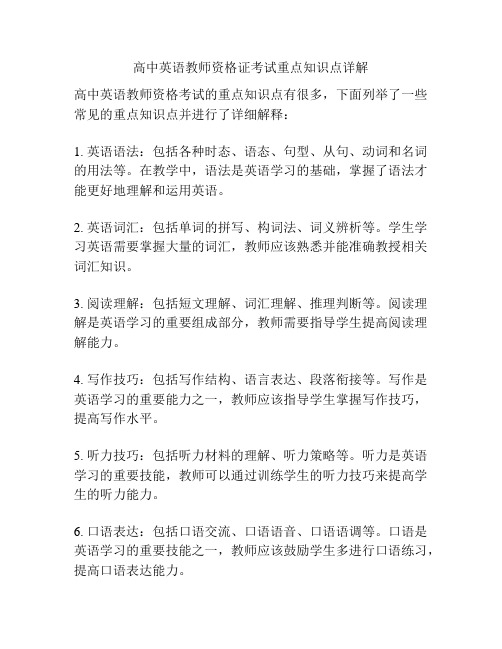
高中英语教师资格证考试重点知识点详解
高中英语教师资格考试的重点知识点有很多,下面列举了一些常见的重点知识点并进行了详细解释:
1. 英语语法:包括各种时态、语态、句型、从句、动词和名词的用法等。
在教学中,语法是英语学习的基础,掌握了语法才能更好地理解和运用英语。
2. 英语词汇:包括单词的拼写、构词法、词义辨析等。
学生学习英语需要掌握大量的词汇,教师应该熟悉并能准确教授相关词汇知识。
3. 阅读理解:包括短文理解、词汇理解、推理判断等。
阅读理解是英语学习的重要组成部分,教师需要指导学生提高阅读理解能力。
4. 写作技巧:包括写作结构、语言表达、段落衔接等。
写作是英语学习的重要能力之一,教师应该指导学生掌握写作技巧,提高写作水平。
5. 听力技巧:包括听力材料的理解、听力策略等。
听力是英语学习的重要技能,教师可以通过训练学生的听力技巧来提高学生的听力能力。
6. 口语表达:包括口语交流、口语语音、口语语调等。
口语是英语学习的重要技能之一,教师应该鼓励学生多进行口语练习,提高口语表达能力。
7. 形成性评价与终结性评价:包括考查学生的知识、技能和能力的测试形式。
教师应该掌握各种评价方法和技巧,合理评价学生的学习情况。
以上是高中英语教师资格考试的一些重点知识点,教师需要对这些知识点有深入的理解,并能够灵活运用于教学中,帮助学生提高英语学习能力。
英语教师资格证高频语法重点梳理讲解
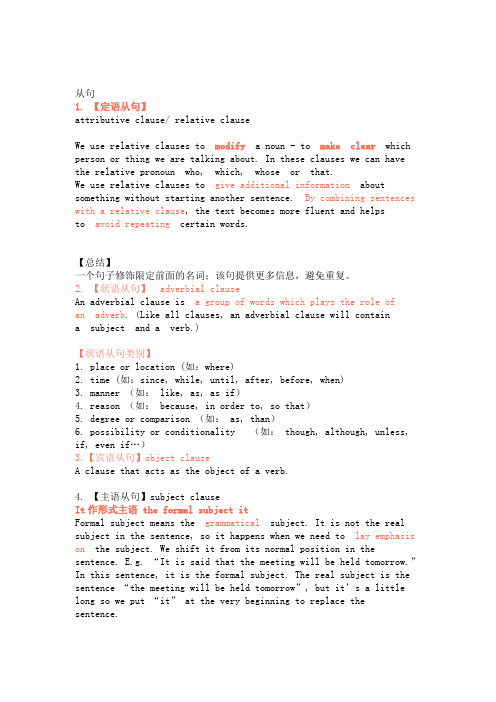
从句1. 【定语从句】attributive clause/ relative clauseWe use relative clauses to modify a noun - to make clear which person or thing we are talking about. In these clauses we can have the relative pronoun who, which, whose or that.We use relative clauses to give additional information about something without starting another sentence. By combining sentences with a relative clause, the text becomes more fluent and helps to avoid repeating certain words.【总结】一个句子修饰限定前面的名词;该句提供更多信息,避免重复。
2. 【状语从句】adverbial clauseAn adverbial clause is a group of words which plays the role of an adverb. (Like all clauses, an adverbial clause will contain a subject anda verb.)【状语从句类别】1. place or location (如:where)2. time (如:since, while, until, after, before, when)3. manner (如: like, as, as if)4. reason (如: because, in order to, so that)5. degree or comparison (如: as, than)6. possibility or conditionality (如: though, although, unless, if, even if…)3.【宾语从句】object clauseA clause that acts as the object of a verb.4. 【主语从句】subject clauseIt作形式主语 the formal subject itFormal subject means the grammatical subject. It is not the real subject in the sentence, so it happens when we need to lay emphasis on the subject. We shift it from its normal position in the sentence.E.g. “It is said that the meeting will be held tomorrow.” In this sentence, it is the formal subject. The real subject is the sentence “the meeting will be held tomorrow”, but it’s a little long so we put “it” at the very beginning to replace the sentence.5. 【表语从句】 predicative clause6. 【同位语从句】 Appositive clauseAn appositive is a noun, a noun phrase, or a noun clause which sits next to another noun to rename it or to describe it in another way.语态被动语态 passive voicePassive voice is used when the focus is on the action. It is not important or not known.Example: My bike was stolen.The passive voice is composed of two elements: the appropriate form of the verb (be) and past participle.被动语态由be动词的合适形式+过去分词构成。
中学教师资格考试:英语高频知识点解读

中学教师资格考试:英语高频知识点解读中学英语教师资格证笔试中考查的英语专业基础知识有单选题中的词汇、语法、语言学和阅读理解。
教师资格证笔试中有2篇阅读,每篇设置5道题目,每篇篇幅长约400-600字左右,文章段落多、句子长、句式复杂,生偏词多,尤其是针对报考高中选段,考试平时即可练习专四(初中)——专八(高中)的阅读试题,提高阅读的速度和做题的准确性;由于阅读是大多数考生较为熟悉的题型,所以这里不会多加赘述,重点放在单选题考查的英语专业基础知识上。
专业基础知识另外一个集中考查点即单选题,其考查的单选题目,乍看知识点纷繁复杂,生僻不重样,让考生望而生畏,丝毫不知从哪着手准备。
但静观近年试题,笔者发现其实它的变化多端中也有规律可循,实则百变不离其宗;就其大知识点范围来划分的话,可粗略分为以下几大类:一、词义辨析和语法题虽然词义辨析和语法题上在资格证考试中不是难点,但是它的重要性不可知否,它的题量一般在5-8题内波动,分值计10-16分。
词义辨析:词汇为专业四级-八级难度左右,【试题示例】Being a direct relative of the deceased,her claim to the estate was____C___.A.optionalpulsoryC.legitimateD.prominentThe Euro has B,but the dollar is up.A.deprecatedB.depreciatedC.depressedD.depraved词义辨析直接考查考生的词汇积累;不难看出,相较初中学段而言,高中资格证考查的词汇更偏更难,对报考高中学段的考生提出的要求更高,如试题:A.a chaperon B.a steward C.ruffian D.an atheist。
对此,考生平时可通过阅读的方式间接积累词汇,也可直接背诵专四专八词汇书,掌握程度达到“再认”即可。
语法亦是资格证的必考点,其考查的语法知识点相对比较常规,现将往年出现的高频必考语法点罗列呈现如下:冠词;连词;动词的时态;非谓语动词;虚拟语气;三大从句(名词性从句、定语从句、状语从句);特殊句式(倒装句、强调句、省略句);如__D__conscious of her moral obligations as a citizen.A.Marsha was and always will beB.Marsha has to be and always will beC.Marsha had been and will always beD.Marsha has been and will always beA who had arrested him three times for smuggling.A.Before John stood the policemanB.Before the policeman stood JohnC.Before the policeman John stoodD.Before John the policeman stood在备考语法的过程中,广大考生可针对高频语法考点,结合自己的薄弱项,多疏通,多理解,多做题(高考或者专业四级语法试题),查漏补缺即可。
教师资格证考试英语学科知识语言学整理高中英语

教师资格证考试英语学科知识语言学整理高中英语学科知识中语言学并不是唯一的部分,不过是比较难理解的部分。
其实语言学只要知道专业名词意思是什么,题目很好做的。
特此整理一份语言学手册,尽量给出通俗解释帮助大家快速掌握抽象在风中的语言学相关概念。
此外,我在百度上看到一个学科知识的总结也挺好的,可以结合TKT知识理解复习。
预祝教资顺利。
一、语言学基本概念1. 语言概念及功能:Language is a system of arbitrary vocal symbols used for human communication. 语言是人类用来交际的任意性的有声符号体系。
语言学概念中,语言本质上是声音符号,文字只是声音的载体。
语言学中认为声音和意义的对应是任意的,是约定俗成的。
我们所创造出来的发音和这个事物的本身并没有任何内在的联系。
说白了就是所有人管叫做“xiao lian”,“xiao lian”才对应了意义,我们也可以管这个叫做“ku lian”,如果大家都这么约定的话。
语言的功能:(便于理解,做通俗解释)信息功能informative:传递信息人际功能interpersonal:表达讲话者身份、地位、态度、动机及其对事物推断等方面的功能施为功能performative:用语言去做事情,比如用“好冷啊”去让人关门。
感情功能emotive function:表达感情感受寒暄功能phatic communication:比如问候娱乐功能recreational function:比如相声元语言功能metalingual function:用语言解释语言(此概念重要)真题链接:The language used to describe the language itself is called __________.A. paralanguageB. special languageC. metalanguageD. interlanguage2. 语言学:Linguistics is the scientific study of language.语言学是对语言的科学研究。
招教笔试英语必背考点
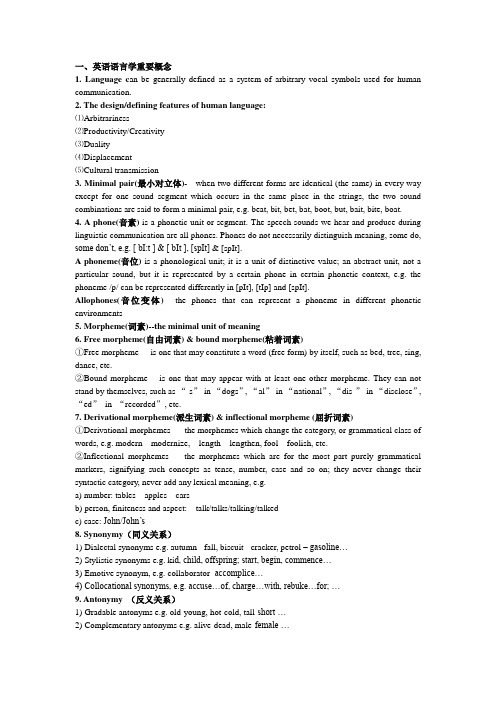
一、英语语言学重要概念1. Language c an be generally defined as a system of arbitrary vocal symbols used for human communication.2. The design/defining features of human language:⑴Arbitrariness⑵Productivity/Creativity⑶Duality⑷Displacement⑸Cultural transmission3. Minimal pair(最小对立体)----when two different forms are identical (the same) in every way except for one sound segment which occurs in the same place in the strings, the two sound combinations are said to form a minimal pair, e.g. beat, bit, bet, bat, boot, but, bait, bite, boat.4. A phone(音素) is a phonetic unit or segment. The speech sounds we hear and produce during linguistic communication are all phones. Phones do not necessarily distinguish meaning, some do, some don’t, e.g. [ bI:t ] & [ bIt ], [spIt] & [spIt].A phoneme(音位) is a phonological unit; it is a unit of distinctive value; an abstract unit, not a particular sound, but it is represented by a certain phone in certain phonetic context, e.g. the phoneme /p/ can be represented differently in [pIt], [tIp] and [spIt].Allophones(音位变体)----the phones that can represent a phoneme in different phonetic environments5. Morpheme(词素)--the minimal unit of meaning6. Free morpheme(自由词素) & bound morpheme(粘着词素)①Free morpheme----is one that may constitute a word (free form) by itself, such as bed, tree, sing, dance, etc.②Bound morpheme----is one that may appear with at least one other morpheme. They can not stand by themselves, such as “-s”in “dogs”, “al”in “national”, “dis-”in “disclose”, “ed”in “recorded”, etc.7. Derivational morpheme(派生词素) & inflectional morpheme (屈折词素)①Derivational morphemes---- the morphemes which change the category, or grammatical class of words, e.g. modern---modernize, length---lengthen, fool---foolish, etc.②Inflectional morphemes---- the morphemes which are for the most part purely grammatical markers, signifying such concepts as tense, number, case and so on; they never change their syntactic category, never add any lexical meaning, e.g.a) number: tables apples carsb) person, finiteness and aspect: talk/talks/talking/talkedc) case: John/John’s8. Synonymy(同义关系)1) Dialectal synonyms e.g. autumn - fall, biscuit - cracker, petrol –gasoline…2) Stylistic synonyms e.g. ki d, child, offspring; start, begin, commence…3) Emotive synonym, e.g. collaborator- accomplice…4) Collocational synonyms, e.g. accuse…of, charge…with, rebuke…for; …9. Antonymy (反义关系)1) Gradable antonyms e.g. old-young, hot-cold, tall-short …2) Complementary antonyms e.g. alive-dead, male-female …3) Relational opposites e.g. husband-wife, father-son, doctor-patient, buy-sell, let-rent, employer-employee, give-receive, above-below …10. Componential analysis---- a way to analyze lexical meaning.Man: [+HUMAN, +ADULT, +ANIMATE, +MALE]Boy: [+HUMAN, -ADULT, +ANIMATE, +MALE]Woman: [+HUMAN, +ADULT, +ANIMATE, -MALE]Girl: [+HUMAN, -ADULT, +ANIMATE, -MALE]11. Speech act theory①The locutionary act(言内行为)----an act of saying something, i.e. an act of making a meaningful utterance (literal meaning of an utterance);②The illocutionary act(言外行为)----an act performed in saying something: in saying X, I was doing Y (the intention of the speaker while speaking).③The perlocutionary act(言后行为)----an act performed as a result of saying something: by saying X and doing Y, I did Z.12. Four maxims of CP Cooperative principle(会话原则)①The maxim of quality(质量原则)②The maxim of quantity(数量原则)③The maxim of relation(关系原则)④The maxim of manner(方式原则)二、英美文学非常重要的作家作品1. 英国古英语时期(499-1066)《贝奥武甫》(Beowulf)是英国盎格鲁•撒克逊时期的一首英雄史诗,古英语文学的最高成就,同时标志着英国文学的开始。
2023年教师资格笔试备考英语语言学高频考点解析

2023教师资格笔试备考:英语语言学高频考点解析2023年01月13日13:40:41 来源:宁夏中公教育一、语言学概述之高频考点I. Design Features of Language1. ArbitrarinessArbitrariness means a word’s sound and meaning which have no logical relations.“爱”用英语体现为“love”;使用方法语体现为“amour”;用日语体现为“愛”。
2. DualityLanguage is a system, which consists of two sets of structures, one of sounds, and the other of words.语言是由低级构造旳语音和高级构造旳词构成旳系统,如[b],[i],[t],单独来看,这三个音素都没故意义,不过当它们组合在一起就有了意义[bit](bit)。
3. CreativityLanguage can be used to create new meanings due to its duality and recursiveness.由于语言旳双重性和递归性,说话者可以发明出从未听说过或从未使用过旳句子。
I want to visit Mary who lives in a country where the scenery is beautiful which has attracted so many tourists…4. DisplacementLanguage can be used to refer to things that are not present: real or imagined matters in the past, present, or future or in faraway places.人们可以使用语言符号表述在时间上或空间上不可及旳物体、时间或观点。
- 1、下载文档前请自行甄别文档内容的完整性,平台不提供额外的编辑、内容补充、找答案等附加服务。
- 2、"仅部分预览"的文档,不可在线预览部分如存在完整性等问题,可反馈申请退款(可完整预览的文档不适用该条件!)。
- 3、如文档侵犯您的权益,请联系客服反馈,我们会尽快为您处理(人工客服工作时间:9:00-18:30)。
教师资格笔试备考英语语言学高频考点解析
教师资格笔试备考:英语语言学高频考点解析01月13日13:40:41 来源:宁夏中公教
育
一、语言学概述之高频考点
I. Design Features of Language
1. Arbitrariness
Arbitrariness means a word’s sound and meaning which have no logical relations.
“爱”用英语表示为“love”;用法语表示为“amour”;用日语表示为“愛”。
2. Duality
Language is a system, which consists of two sets of structures, one of sounds, and the other of words.
语言是由低级结构的语音和高级结构的词组
成的系统,如[b],[i],[t],单独来看,这三个音素都没有意义,可是当它们组合在一起就有了意义[bit](bit)。
3. Creativity
Language can be used to create new meanings due to its duality and recursiveness.
由于语言的双重性和递归性,说话者能够创造出从未听说过或从未使用过的句子。
I want to visit Mary who lives in a country where the scenery is beautiful which has attracted so many tourists…
4. Displacement
Language can be used to refer to things that are not present: real or imagined matters in the past, present, or future or in faraway places.
人们能够使用语言符号表述在时间上或空间
上不可及的物体、时间或观点。
5. Cultural transmission
On one hand, it means humans are born with the capacity to acquire human language. On the other hand, humans acquire language through teaching and learning.
人类语言依靠文化或习俗传统得以代代相传,语言知识必须要经过学习才可获得。
6. Interchangeability
It means anyone can be the producer and receiver of the language.
人类的语言没有性别和年龄的障碍,人们能够想到理解对方所说的内容。
II. Functions of Language
1. Informative function
Language is used to convey information.
例如:在摄氏零度时,水会开始结冰(标准大气压下)。
2. Interpersonal function
It is concerned with the interaction between the speaker and hearer in the discourse.
人际功能主要涉及说话者和听话者之间在话
语情景中的互动和说话者对她所说或所写的事
情的情感与态度。
3. Performative function
It means speech can be used to do things.
在婚礼上,主持人说:“现在我宣布你们正式结为夫妻。
”
4. Emotive function
It uses language to create certain feelings in the hearer.
例如:“天啊”。
5. Phatic function
It means that language is used for establishing an atmosphere or maintaining social contact.
问候语和告别语等都属于寒暄功能。
6. Recreational function
Language is used to create entertainment.
儿童的语言游戏,成年人吟诗,唱歌曲都属于娱乐功能。
7. Metalingual function
Language is used to explain itself.
数学中的1很难定义,相比之下,2和3就能够借助于1来定义,语言用于谈论和研究语言本身时,则行使元语言功能。
二、例题分析
1. “A rose by any other name would smell as sweet”. This famous quotation from Shakespeare illustrates that language has the design feature of _____.。
